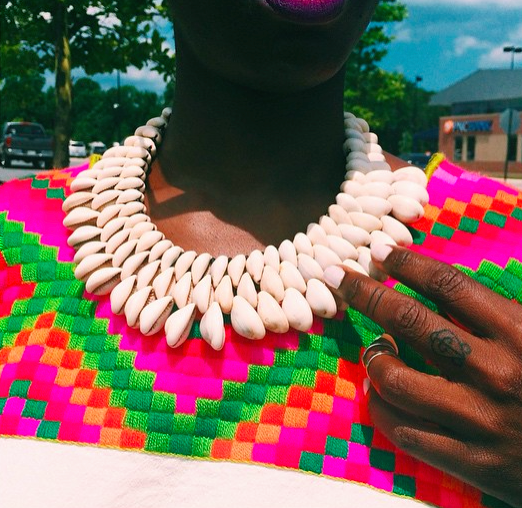
the idea of ornament does not attempt to meet conventional standards, but it satisfies the soul of its creator.
-zora neale hurston
me: “i’m getting a double-helix piercing tomorrow.”
her: “is your job gonna be cool with that?”
i left the previous exchange with a friend really annoyed. whether my hair, piercing, tattoos or clothing, i’m sick of people feeling the need to question my adornment choices.
first, i’ve been obsessed with body art my entire life. i waited until my mid-twenties to get my first tattoo and all three are meaningful: eye of horus, marcus garvey quote and adinkra symbol. they represent an aspect of my identity that i made a conscious choice to share with the world. keeping my deliberate intention in mind, i’m bothered when people, too often well-meaning black folks, attempt to police my decisions.
black women undergo workplace assimilation and endure constant microaggressions not for fun, but because we’re told it’s necessary to ensure our success. straight hair, muted clothing, “it” handbags, no visible tattoos — we conform to white society’s definition of respectability and workplace appropriateness.
recently, a sister complimented my hair and said the last time she wore her natural hair to court (she’s an attorney) the judge and security guard didn’t recognize her. they refused to allow her to sit at a table reserved for lawyers, and she was forced to state on the record why she’d been denied a seat. i’m struck by her example because straight hair literally operated as a disguise; ironically, leaving her natural image unrecognizable by white peers.
policing black women’s adornment fails to question the system that decided “respectability” is a necessary component of success. my people did not define it, and i won’t be forced to comply with a standard that’s narrowly tailored for the purpose of marginalization.
i understand that my position is born not only from a spirit of rebellion, but also educational privilege. black women working in low-paying jobs or fighting chronic underemployment while supporting their families don’t have the option to forgo certain workplace norms regarding their physical presentation. but i do. as a result, those of us with similar privilege must work to widen restrictive spaces and fight the pressure to assimilate. whether we’re rocking stilettos, bow ties or dashikis, taking an unapologetic stance on our wholeness helps to make workplaces more tolerable.
i will adorn myself as i please and any professional space that finds my practice problematic is an affiliation that i’m blessed to do without. authenticity is the highest value. i graduated phi beta kappa from my undergraduate university, earned a law degree from a top tier institution, sit on the board of directors for a civil liberties organization, yet have natural hair, dark skin, tattoos and piercings. their definitions of respectability will never change unless we rebel.

AMEN!!!!!!!!!!!!!!!!!!!!!!!!! I just LOVE ALL your posts/blogs.
Reminds me of my “working days” — I was constantly asked if I thought I would intimidate the “others” in the office by wearing my African jewelry. MY JEWELRY!!!!???????? (large amber beads and beaded bangles)
Later, when selling my home, I was told to remove all references of my African/Black Memorabilia Artifacts/Books. Of course, I did not, and the home sold within a week. (“house might not be sold to/seen by white customers — too intimidating to see all those Black images”).
btw., I assure you our home is not overrun with lions, elephants, and tigers, — or overloaded with huge masks everywhere. The decor is quite tasteful.
(I used to volunteer at the Smithsonian’s Museum of African Art — most of the African artifacts were donated by a white man, to start the museum).
hhmmmm, I guess I am just an elderly lady who also feels “my position is born not only of rebellion, but also educational priviledge.”
Author
Thanks so much for reading! It’s great to hear from an elder who’s fought (and sounds like continues to fight) a similar struggle. You can pass some of those amber beads and bangles my way too 🙂
This was such a timely piece and I thoroughly appreciate. This week a youtuber Seren who goes by the name sensei aishitemasu did a few videos delving into this topic and yours took a different angle, but nevertheless some valid remarks. I have locs, not the neat type and almost completed my MSc. although I am not American and I am located in the Middle East I am yet to deal with such issue of “hair” but the constant stares and asking for photos…. However, in other facets of my life experience so far are the natives expecting me as an African to always get up and give them seat in the bus,or a cashier pointing to the cash machine and not saying my total price, even though I can speak their language…(to which I patiently stand in the supermarket until he or she tell me the total with actual words). So thank you for these post:))))
Author
Thanks for reading and sharing your experience in the Middle East.